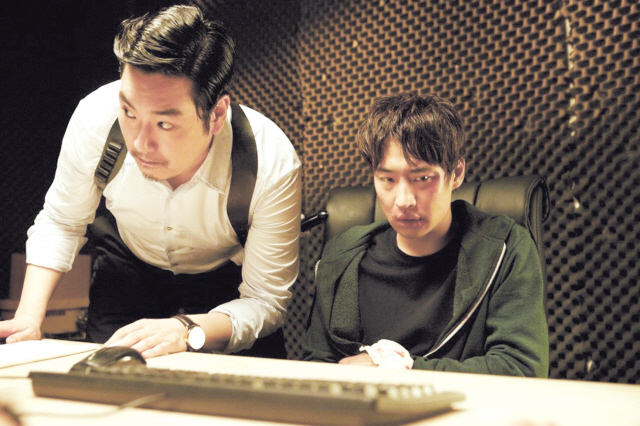Many would expect to see the good guy and the bad guy ― or the innocent victim and the killer ― in a murder flick, but writer-director Park Myung-rang’s original feature debut breaks all the rules: it is only about the bad guys, all unspeakably bad, with their own excuses and problems.
Titled “An Ethics Lesson,” the film deals with the murder of a college student in her apartment. While being an engaging drama about murder, the film also presents an original analysis on anger, violence and ethics, as well as the complex connection between selfishness and self-pity.
The movie does not keep the murderer a mystery; the viewers learn who the murderer is in the first half of the piece, through the most bizarre way possible.
 |
A scene from director Park Myung-rang’s “An Ethics Lesson” (Lotte Entertainment) |
The first person who witnesses the crime, along with the audience, is the victim’s neighbor Jeong-hoon (played by Lee Je-hoon), who has been secretly watching her, his long-time secret crush, through a hidden camera ― which he illegally set up on her property when she was not around.
What is worse is that he is a young policeman, who is perceived as rather docile and polite by his coworkers and neighbors. He does not feel guilty about what he does with the camera; “I’m not hurting anyone (by doing this),” he says in the movie, genuinely believing he is harmless.
Then the viewers are introduced to four other characters ― including the murderer ― whose deeds are not any less terrible than Jeong-hoon’s.
One of them is Hyeon-su (played by Kim Tae-hoon), the murderer, who killed the victim upon discovering her affair with a married professor. A man named Myeong-rok (played by Cho Jin-woong) presents himself as the late victim’s good-hearted uncle, but he in fact is a loan shark who owes the victim money.
Then there is Byeong-gyu, a famed, respected professor who only uses the victim for sex. Because the victim gets killed right after Byeong-gyu’s visit to her apartment, he is falsely accused of the murder and jailed. His wife, Seon-hwa (Moon So-ri), learns of her husband’s secret affair with the victim upon his arrest, and only seeks ways to get her revenge against Byeong-gyu ― she’s not really interested in finding out who in fact killed the victim.
Things get ugly as the loan shark Myeong-rok steals Jeong-hoon’s video tapes and makes a plan to use them for money. The scene where all of the characters, excluding the jailed Byeong-gyu, confront each other in a photo studio with guns and knives is the highlight of the film. The particular scene is more theatrical than cinematic; the photo studio’s white floor serves as a stage, while the actor’s performance, which resembles stage acting, makes viewers feel like they are in the audience of a live play.
The movie interestingly focuses on each character’s moment of anger, the kind of anger that one cannot possibly control.
For instance, Jeong-hoon gets infuriated when he learns his video tapes, which he created illegally, have been stolen. The stalker Hyeon-su gets so angry that he commits a murder when he learns that the “love of his life” ― who is in fact a victim of his stalking ― is sleeping with someone else. Seon-hwa, who is arguably the worst villain among the five, becomes ruthless when learning about her husband’s affair. She hatches a detailed plot for revenge against him, to take away his public fame and wealth.
All of the characters have one thing in common: They all feel sorry for themselves, and almost consider themselves victims of misfortune, while not feeling guilty at all for the criminal, illegal and unethical deeds of their own. Jeong-hoon genuinely feels he is being victimized by the theft of his video tapes, having no grasp of why his voyeuristic activity is illegal. Hyeon-su considers himself a victim of love and betrayal, and even absurdly justifies his crime: “I had to do it for love,” he says. The characters show the most utter form of selfishness.
The villains’ self pity and victim mentality, ironically, create moments of dark humor throughout the movie. The characters often look rather bizarrely silly and foolish, rather than malicious and evil. One of the notable achievements of this film is the exploration of human psychology by showing the worst-case scenario of what happens when one’s anger meets one’s grand self-pity ― often stemming from their insecurities ― and decides to act on emotions.
A Lotte Entertainment release, “An Ethics Lesson” opens in theaters on Feb. 21.
By Claire Lee (
dyc@heraldcorp.com)






![[Herald Interview] 'Trump will use tariffs as first line of defense for American manufacturing'](http://res.heraldm.com/phpwas/restmb_idxmake.php?idx=644&simg=/content/image/2024/11/26/20241126050017_0.jpg)
![[Exclusive] Hyundai Mobis eyes closer ties with BYD](http://res.heraldm.com/phpwas/restmb_idxmake.php?idx=644&simg=/content/image/2024/11/25/20241125050044_0.jpg)
